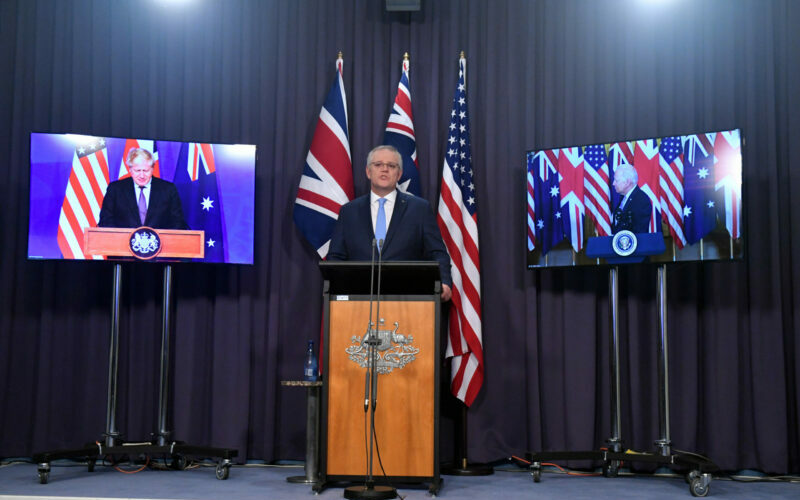
The AUKUS pact may make strategic sense — Australia, after all, needs to seek partnerships. But at present, it’s almost wholly symbolic.
Scott Morrison may be the Australian leader whose name, to his face, the current US president seemed to forget when announcing the AUKUS defence pact last month, but with this deal, the current prime minister in Canberra burnishes his reputation as the most actively hostile to China that the country has ever had.
Morrison as treasurer in the earlier 2010s was famous for blocking investment deals with China. These were not on economic grounds.
Australia said repeatedly at that time it was open to Chinese investment and partnership. It was always on political issues, and security.
Chinese investment via Hong Kong in the state grid was rejected. So was an attempt to buy the Kidman estate. With this track record, there should be little surprise that the unhappy experience of the pandemic should have pushed Morrison more decisively towards almost wholesale rejection of the country’s largest trading partner for the last 10 years.
The levels of emotion surrounding debate about China in Australia have crept up recently. Online fights often end in a version of social media butchery.
Australians of Chinese heritage have complained of harassment and worse. Chinese students who continue to flock to Australian universities must be wondering whether their money isn’t ending up funding a vast machine producing fear, and at times, what looks like loathing.
After the initial shock following AUKUS’s announcement, we can now take stock.
The defence pact itself may well have eminent strategic sense. The ANZUS treaty which prevailed between America, New Zealand and Australia from 1951 when it was established, became increasingly fragile when New Zealand started to object to nuclear weapons being potentially located on its pristine isles in the 1980s.
In many ways, the treaty has been at best dormant, and at worst defunct in the last couple of decades. That may well explain the need to create something new, and to replace New Zealand with a more reliable partner. The problem is that the UK happens to be absolutely remote from the region, and has little to bring to the trio apart from symbolic support.
In many ways, AUKUS is almost wholly about symbolism at present.
Whatever nuclear submarines might end up being delivered are a decade or more away.
For Australia, AUKUS is a new acronym that underlines just how crucially necessary the alliance with the US is. It is, in many ways, a plea for relevance to Washington after the dark moment when Joe Biden’s predecessor Donald Trump, after having found the country on a map, wondered aloud in a conversation with Morrison’s predecessor Malcolm Turnbull what exactly the relationship with Canberra delivered.
With the ink down dried on this deal, Australia may well feel that it can at least relax a little, despite initial heated fury from France.
Even so, the context in which it has made this agreement remains a hugely problematic one. Iron ore exports from Western Australia in particular continue to be sent, in healthy and vast quantities, to the only customer of any size that can take them — China.
Even coal-loving Morrison has to acknowledge now the high levels of anxiety and public fear about the impact of climate change on Australia, which could be far more critical and faster than other less vulnerable ecosystems.
China’s signing up to a significant environmental deal at COP26 matters for everyone — but it is particularly important for a country that is experiencing 40 centigrade plus temperatures and droughts as a new normal now, rather than an aberration.
The means that in the matrix of balancing risk and assessing what is in Australia’s long-term benefit, China poses extremely complex questions.
The impact of poor decisions here could be immense. Chinese students have largely bankrolled Australian universities for over a decade. Chinese investment and trade remain hugely important for Australia’s economy, and may well be even more so as the impacts of long lockdowns wash across the local economy.
Like everyone else, the country is moving into an era of intense uncertainty. It needs to keep options open, and show strategic flexibility and adaptability.
If the AUKUS pact was an attempt to do this, the way it does so has not come through in terms of how the pact was announced publicly.
China’s response was shrill, but, perhaps reassuringly, almost routine. Its attitude towards the Morrison government in particular has become abrasive, with the Chinese ambassador in Canberra perhaps unwisely issuing a long list of areas of discontent like a report card earlier this year.
Even so, the brute fact is that it has more options than its southern neighbour. China sits in the centre of the Asia Pacific region, utterly unavoidable, politically and economically. It cannot be wished away. Intentionally or unintentionally, its economic clout and its regional aspirations impact on all those around it.
Australia is not alone in facing the huge quandary that this situation presents.
A power with utterly different values and a completely alien political system is, alas, also on the surface a powerful and important commercial, manufacturing and finance actor.
The challenge for Australia in the recent past was simply how to engage with the opportunities this offered without being simply swamped and having its identity fundamentally changed and challenged. Perhaps that is the reason why the attempts to create some boundaries and push back have been so sharp in the last couple of years.
The issue is that, again, like everyone else, including the mighty US, the challenges that China now poses are far too large to manage bilaterally.
Australia is not in control of what is happening. It has to seek partnerships. Washington is the most important and the most obvious. Even in the Vietnam War, where the UK did refuse to send troops, Australia stood by the US. It has been the ever faithful ally.
It is an interesting question just how much of reason for AUKUS came from active Australian lobbying, or via edicts and orders from the US. In this space, Australia is, alas, not in a position to say no.
Which brings us to the role of the UK in this deal.
The UK’s position is a strange one. Unlike the US and Australia it cannot remotely present itself as a regional player.
With its new aircraft carrier, it does like the idea of sailing the waters of the Indian Ocean making clear that Britain is global and great again, after throwing off the chains of subjugation under the European Union.
But this is absolutely for symbolic ends.
It is hard to see what the UK could ever do in the region apart from back up the US and others who have much more capacity there.
Even so, more starkly than with the Australians, this pact shows that “getting back control” for the UK after leaving the EU means that foreign policy is now no longer made in Brussels, but in Washington.
The lengths to which the UK will go to be close to America have never been clearer. And with France furious at the cancelled submarine deal it had with Australia, breaking a precedent and recalling its ambassadors to Washington and Canberra in late September, it’s apparent that even if AUKUS creates more stability and security in Asia at some point, it has done the complete opposite in Europe.
And while things have since calmed down a little, for everyone, including those involved in the pact, such visible signs of disagreement and division are not a good thing.




